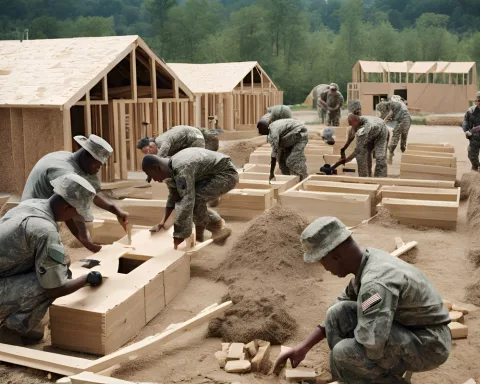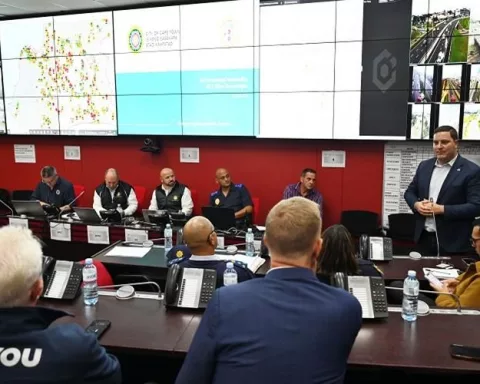The transfer of the Parliament TV Studio from MultiChoice to Parliament represents progress towards democratic transparency and increased public engagement. The partnership has amplified parliamentary broadcasting abilities, offering uninterrupted coverage of parliamentary proceedings, 24/7 via Parliament TV. The new state-of-the-art studio symbolizes resilience and progress, providing another platform for local and community media to gain access to parliamentary content. This ensures more people are informed about Parliament’s work and can actively engage in its processes.
A New Chapter in Democratic Transparency
The Parliament TV Studio’s transfer from MultiChoice signifies progress towards democratic transparency and increased public engagement. The partnership has amplified parliamentary broadcasting abilities, offering uninterrupted coverage of parliamentary proceedings, 24/7 via Parliament TV. The new state-of-the-art studio symbolizes resilience and progress, providing another platform for local and community media to gain access to parliamentary content. This ensures more people are informed about Parliament’s work and can actively engage in its processes.
A New Chapter in Democratic Transparency
When Ms. Nosiviwe Mapisa-Nqakula, the Speaker of the National Assembly, presided over the formal transfer of the Parliament TV Studio from the MultiChoice Group, it was more than a ceremonial event. It represented a substantial step toward solidifying democratic transparency and fostering increased public engagement.
The occasion drew a distinguished gathering, including the NCOP Chairperson Amos Masondo, Deputy Chairperson Sylvia Lucas, Deputy Speaker Lechesa Tshenoli, along with many honourable members. They convened to celebrate and solidify the role of parliamentary oversight, an essential function for enhancing the government’s service to the people.
One of the key aspects of the Legislative Sector Oversight Summit was its emphasis on bolstering the ability of provincial and national legislatures to keep the Executive in check. The Speaker underscored that the oversight function is about actualising the aspirations of the electorate through the mandate entrusted to public servants.
This is fundamentally about accountability and feedback. Establishing a responsive communication system within Parliament and investing in its own broadcasting capabilities forms part of this goal.
Strengthening Parliamentary Broadcasts Through Partnership
Parliament’s enduring alliance with MultiChoice Group has been fruitful over the years. Together, they have amplified parliamentary broadcasting abilities primarily through Parliament TV (Channel 408 on DSTV), a Corporate Social Investment initiative by MultiChoice. This channel has been instrumental in offering uninterrupted coverage of parliamentary proceedings, 24/7.
Originally, the channel was dedicated to airing House sittings for eight hours a day. However, in recent years, the scope of the broadcasting services expanded to include live committee meetings, House sittings, public hearings across various provinces, and unique projects.
This extended coverage has played a significant role in fulfilling the constitutional mandate of conducting parliamentary affairs in an open, accessible manner and contributing to citizens’ engagement with democratic processes.
A Testament to Resilience and Progress
In 2021, MultiChoice showcased its commitment to parliamentary broadcasting services by setting up a state-of-the-art studio with a fully-equipped control room, the Final Control Centre (FCC). Even after the initial FCC was destroyed by a fire in 2022, MultiChoice’s unwavering support facilitated the creation of a new studio, guaranteeing the uninterrupted continuity of parliamentary work.
The reconstruction goes beyond merely rebuilding the studio. Investing in advanced technologies for broadcasting services sets the stage for a future in which Parliament’s communication capabilities are amplified and diversified, ensuring effective dialogue with constituents.
The 4th industrial revolution has revolutionised communication, offering an array of tools to enhance transparency, stimulate discourse, and foster increased public engagement. The surge in social media has altered the processes of information distribution and consumption, creating novel avenues for citizens to express their views, provide feedback, and stay updated regarding parliamentary proceedings.
However, the potential of technology carries the duty of preserving the integrity of parliamentary communication. The verification of information and promoting responsible use of social media are paramount to maintain public trust, necessitating robust measures.
Public broadcasting of parliamentary proceedings is crucial to fulfil Parliament’s mandate of enabling public access to its processes. This focus on transparency bridges the gap between public representatives and citizens, civil society, and the media.
Shaping the Future of Democracy
With the inauguration of the new studio, Parliament has provided an extra platform for the media, particularly local and community media, to gain access to parliamentary work content. This ensures more people are informed about Parliament’s work and can actively engage in its processes.
This milestone aligns with the celebration of three decades of democracy and the democratic Parliament. As the sixth term of the democratic Parliament concludes, the new studio emerges as a symbol of progress and a platform for enhancing Parliament’s work in the upcoming 7th term and onwards.
The studio’s reconstruction embodies the resilience of our democracy and Parliament as an institution. It signifies the ‘Phoenix’ rising from the ashes, bearing witness to the people’s capacity to surmount adversity. This is our tribute to them.
Delving Deeper into Parliament
Parliament’s various committees play a pivotal role in the legislative process with the power to summon individuals to present evidence or documents, receive public petitions, representations or submissions.
Parliament urges the public to engage more intensively with the democratic process. They can arrange a visit, attend a debate, or ask for more information.
Among Parliament’s notable members is Ms. Mbali Dlamini, a representative of the Economic Freedom Fighters from Mpumalanga. Ms. Dlamini serves on several committees, including the Select Committee on Cooperative Governance and Traditional Affairs, Water and Sanitation, and Human Settlements.
The inauguration of the new Parliament TV Studio is a testament to the progress of our democratic institutions and the bright future ahead. As we leverage new technological advancements, we aim to make Parliament’s work more accessible to the public and foster greater democratic participation. In doing so, we persist in striving towards our objective of serving the public better.
What is the Parliament TV Studio and why is its transfer significant?
The Parliament TV Studio is a broadcasting facility that provides uninterrupted coverage of parliamentary proceedings, 24/7 through Parliament TV. Its transfer from MultiChoice to Parliament represents progress towards democratic transparency and increased public engagement, ensuring that more people are informed about Parliament’s work and can actively engage in its processes.
How has MultiChoice Group contributed to parliamentary broadcasting abilities?
MultiChoice Group has been Parliament’s enduring partner in amplifying parliamentary broadcasting abilities primarily through Parliament TV, offering extended coverage that includes live committee meetings, House sittings, public hearings across various provinces, and unique projects. This has played a significant role in fulfilling the constitutional mandate of conducting parliamentary affairs in an open, accessible manner and contributing to citizens’ engagement with democratic processes.
What does the new state-of-the-art studio signify?
The new state-of-the-art studio signifies resilience and progress, providing another platform for local and community media to gain access to parliamentary content. It sets the stage for a future in which Parliament’s communication capabilities are amplified and diversified, ensuring effective dialogue with constituents.
How is the studio significant in shaping the future of democracy?
The studio’s inauguration aligns with the celebration of three decades of democracy and the democratic Parliament. As the sixth term of the democratic Parliament concludes, the new studio emerges as a symbol of progress and a platform for enhancing Parliament’s work in the upcoming 7th term and onwards. It ensures more people are informed about Parliament’s work and can actively engage in its processes, bridging the gap between public representatives and citizens, civil society, and the media.
What is the role of Parliament’s committees in the legislative process?
Parliament’s committees play a pivotal role in the legislative process with the power to summon individuals to present evidence or documents, receive public petitions, representations or submissions. They provide an important avenue for citizens to engage with the democratic process.
Who are some notable members of Parliament and what committees do they serve on?
Ms. Mbali Dlamini, a representative of the Economic Freedom Fighters from Mpumalanga, serves on several committees, including the Select Committee on Cooperative Governance and Traditional Affairs, Water and Sanitation, and Human Settlements. She is one of the many notable members of Parliament who play a crucial role in shaping the future of democracy through their work in various committees.












